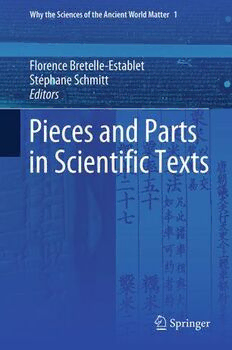
Pieces and Parts in Scientific Texts PDF
353 Pages·2018·8.509 MB·English
Most books are stored in the elastic cloud where traffic is expensive. For this reason, we have a limit on daily download.
Preview Pieces and Parts in Scientific Texts
Description:
This book starts from a first general observation: there are very diverse ways to frame and convey scientific knowledge in texts. It then analyzes texts on mathematics, astronomy, medicine and life sciences, produced in various parts of the globe and in different time periods, and examines the reasons behind the segmentation of texts and the consequences of such textual divisions. How can historians and philosophers of science approach this diversity, and what is at stake in dealing with it? The book addresses these questions, adopting a specific approach to do so. In order to shed light on the diversity of organizational patterns and rhetorical strategies in scientific texts, and to question the rationale behind the choices made to present such texts in one particular way, it focuses on the issue of text segmentation, offering answers to questions such as: What was the meaning of segmenting texts into paragraphs, chapters, sections and clusters? Was segmentation used to delimit self-contained units, or to mark breaks in the physical appearance of a text in order to aid reading and memorizing, or to cope with the constraints of the material supports? How, in these different settings and in different texts, were pieces and parts made visible?
See more
The list of books you might like
Most books are stored in the elastic cloud where traffic is expensive. For this reason, we have a limit on daily download.
